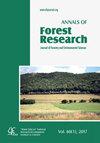在无人飞机系统下的多时段太平洋气旋叶枯病评估
IF 2.9
3区 农林科学
Q2 FORESTRY
引用次数: 0
摘要
太平洋马龙叶枯病(PMLB)是导致太平洋马龙树(杨梅)数量下降的原因之一。多种真菌病原体引起PMLB,导致叶子斑点,最终会杀死叶子,增加个体的压力,使他们更容易患致命的溃疡。孢子通过空气和水滴传播,特别是在潮湿的春季。无人驾驶飞机系统(UAS)技术还处于相对起步阶段,但UAS正变得越来越便宜和容易获得。与载人飞机相比,无人机系统有望提高森林健康监测应用的效率,以相对较低的成本提供更安全的空中数据收集方法。在这项研究中,我们开发并提出了一种用多光谱传感器检测PMLB的UAS方法。该方法将高分辨率(~4厘米)多旋翼平台UAS多光谱图像的正交产品与机器学习和PMLB的地面评估相结合,在多次站点访问期间对单个树级的枯萎病视觉存在进行分类。所建立的模型检测了29棵田间调查的马龙树的PMLB感染状况,kappa系数为,平衡精度为0.85,真阳性率为0.92。这里提出的方法可以很容易地扩展,以有效地覆盖更大的范围,具有超线现场能力的UAS和最小的现场采样。这种方法效率的提高可能对在不久的将来描述PMLB的特征至关重要,因为预计由于气候变化,PMLB的患病率将继续增加。本文章由计算机程序翻译,如有差异,请以英文原文为准。
Multi-temporal Pacific madrone leaf blight assessment with unoccupied aircraft systems
Pacific madrone leaf blight (PMLB) is a contributing agent to the decline of Pacific madrone (Arbutus menziesii) trees. Multiple fungal pathogens cause PMLB, resulting in leaf spotting that can eventually kill leaves, increasing stress in individuals, and leaving them more susceptible to deadly cankers. Spores transmit via air and water droplets, particularly during wet Spring months. Unoccupied aircraft systems (UAS) technologies are in their relative infancy, but UAS are becoming more affordable and accessible. UAS promise increased efficiency in forest health monitoring applications, providing a safer aerial data collection method at a relatively-low cost when compared to occupied aircraft. In this study, we develop and present a UAS methodology to detect PMLB with a multispectral sensor. This methodology combines orthomosaic products derived from high-resolution (~4 cm) multirotor platform UAS multispectral imagery with machine learning and ground assessment of PMLB to classify visual presence of blight at the individual tree-level during multiple site revisits. The resulting model detected PMLB infection status of 29 field surveyed madrone trees with a kappa coefficient of , a balanced accuracy of 0.85, and a true positive rate of 0.92. The method presented here can be readily scaled to efficiently cover a much larger extent with a beyond-line-of-site capable UAS and minimal field sampling. The increased efficiency of this approach may be critical to characterizing PMLB in the near future as it is anticipated that PMLB prevalence will continue to increase as a result of climate change.
求助全文
通过发布文献求助,成功后即可免费获取论文全文。
去求助
来源期刊

Annals of Forest Research
FORESTRY-
CiteScore
2.20
自引率
11.10%
发文量
11
审稿时长
12 weeks
期刊介绍:
Annals of Forest Research is a semestrial open access journal, which publishes research articles, research notes and critical review papers, exclusively in English, on topics dealing with forestry and environmental sciences. The journal promotes high scientific level articles, by following international editorial conventions and by applying a peer-review selection process.
 求助内容:
求助内容: 应助结果提醒方式:
应助结果提醒方式:


